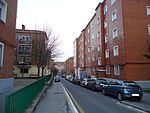Basque Country (autonomous community)

The Basque Country (; Basque: Euskadi [eus̺kadi]; Spanish: País Vasco [paˈiz ˈβasko]; French: Pays Basque), also called Basque Autonomous Community (Basque: Euskal Autonomia Erkidegoa, EAE; Spanish: Comunidad Autónoma Vasca, CAV), is an autonomous community in northern Spain. It includes the Basque provinces of Álava, Biscay, and Gipuzkoa. It also surrounds an enclave called Treviño, which belongs to the neighboring autonomous community of Castile and León. The Basque Country or Basque Autonomous Community was granted the status of nationality within Spain, attributed by the Spanish Constitution of 1978. The autonomous community is based on the Statute of Autonomy of the Basque Country, a foundational legal document providing the framework for the development of the Basque people on Spanish soil. Navarre, which had narrowly rejected a joint statute of autonomy with Gipuzkoa, Álava and Biscay in 1932, was granted a separate statute in 1982. Currently there is no official capital in the autonomous community, but the city of Vitoria-Gasteiz, in the province of Álava, is the de facto capital as the location of the Basque Parliament, the headquarters of the Basque Government, and the residence of the President of the Basque Autonomous Community (the Palace of Ajuria Enea). The High Court of Justice of the Basque Country has its headquarters in the city of Bilbao. Whilst Vitoria-Gasteiz is the largest municipality in area, with 277 km2 (107 sq mi), Bilbao is the largest in population, with 353,187 people, located in the province of Biscay within a conurbation of 875,552 people. The term Basque Country may also refer to the larger cultural region (Basque: Euskal Herria), the home of the Basque people, which includes the autonomous community.
Excerpt from the Wikipedia article Basque Country (autonomous community) (License: CC BY-SA 3.0, Authors, Images).Basque Country (autonomous community)
Maite Zuñiga kalea/Calle Maite Zúñiga, Vitoria-Gasteiz Mendizorrotza (Aretxabaleta)
Geographical coordinates (GPS) Address Nearby Places Show on map
Geographical coordinates (GPS)
| Latitude | Longitude |
|---|---|
| N 42.833333333333 ° | E -2.6833333333333 ° |
Address
Maite Zuñiga kalea/Calle Maite Zúñiga
Maite Zuñiga kalea/Calle Maite Zúñiga
01007 Vitoria-Gasteiz, Mendizorrotza (Aretxabaleta)
Autonomous Community of the Basque Country, Spain
Open on Google Maps









